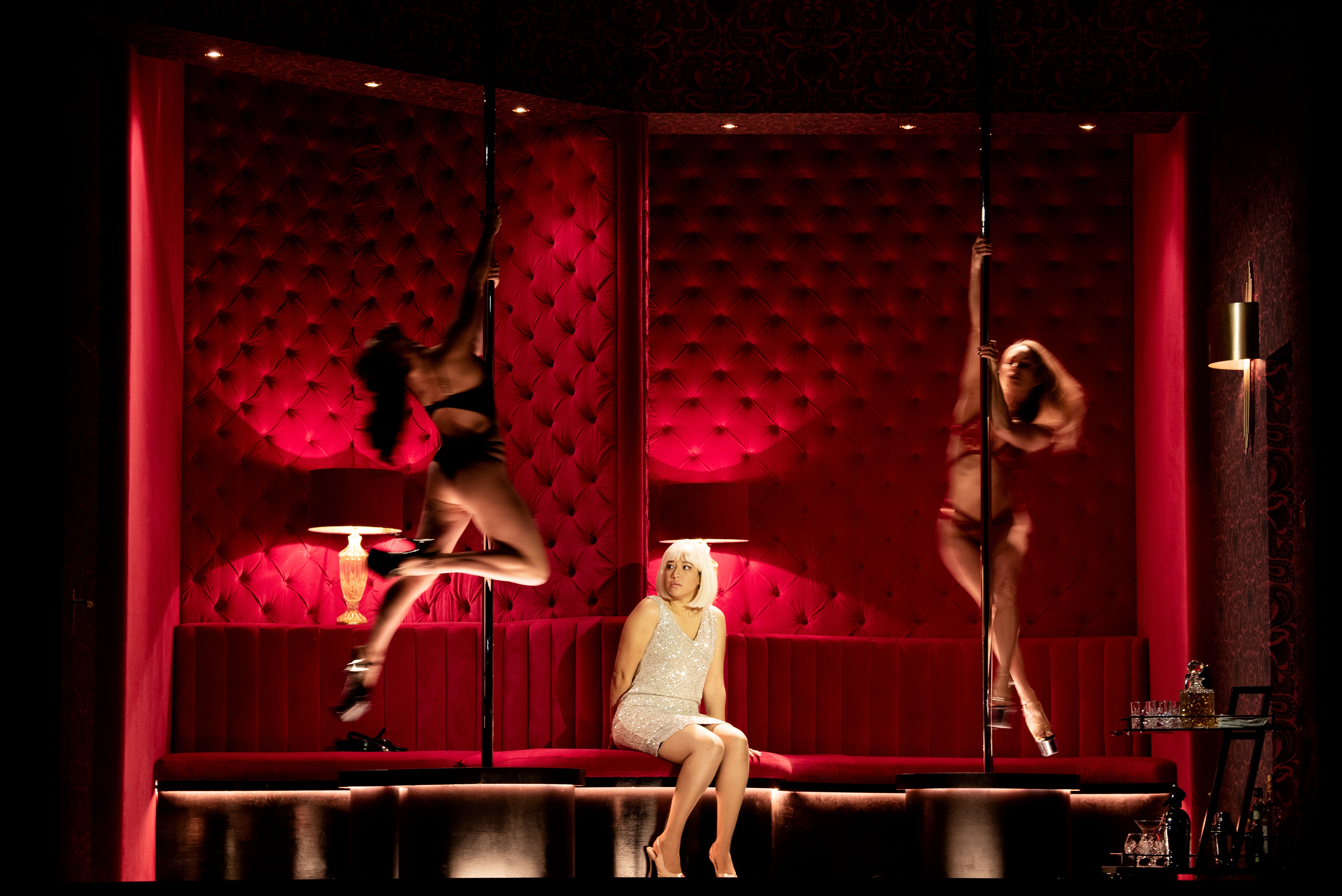Theodora, Royal Opera House, review: Katie Mitchell’s new production is skewed by glib cod-feminism
This new version of Handel’s ‘Theodora’ might be radical with pole dancers and guns, but it’s still musically glorious from start to finish

Handel’s historical oratorio Theodora is one of his most sublime works. And the fact that Katie Mitchell’s new production is brandished as state-of-the-art feminism, boasting two top-of-the-range pole dancers doing their near-naked thing, has certainly drawn the crowd.
The plot is simple. Theodora is a member of the proscribed Christian sect, and the Roman emperor Valens condemns her to serve as a prostitute in the temple of Venus. But she seeks imprisonment and death instead, and, after a temporary rescue by her lover Didymus, goes with him to glorious martyrdom.
As the Handel biographer Jonathan Keates puts it, the essential concept is not a dwelling on simpering religious kitsch, but a contemplation of the enduring human values that induce people to suffer for great causes. This is what powers the sublime duet as the pair are executed. It should be remembered that this is an oratorio, not an opera, and was not intended to be staged: Handel and his contemporaries regarded it as concert music.
Mitchell has other ideas, however, as she makes clear in a programme interview. She decides, with absolutely no supporting evidence, that Theodora is a “Christian fundamentalist” who has concluded that violence is the only way to achieve her religious ends. And Mitchell is turned on by another thought – again her own – which is that when the protagonists exchange clothes to make an abortive escape, Didymus’s brief experience of being in a subordinate (ie female) role shows him what it feels like “to be the recipient of the male gaze”. Meanwhile, Theodora gets her own lesson in “gender politics and agency”.
Such glib cod-feminism pervades the whole work, and it grotesquely skews Mitchell’s production, which is based on her decision to split the stage into two parallel worlds. She introduces a pair of pole dancers, whose technically impressive antics constitute a mimed subplot of their own. The excellent Polish countertenor Jakub Józef Orliński, as Didymus, even gets his own round of applause when one of the pole dancers teaches him how to do it. Mitchell seems to feel uneasy when all that’s going on is singing – no matter how glorious – so each long solo on one side has to be balanced by a slo-mo mimed drama on the other.
And she seems hooked on violence: for half the evening we watch the lounge-suited Romans mystifyingly waving guns at each other. Mitchell has updated the action to a present-day embassy in which the Christians work in the kitchen while the Roman nobs quaff their bubbly upstairs. It’s more than a bit redolent of Downing Street.
Royal Opera House pre-publicity made much of the fact that there has been an “intimacy adviser” to ensure that female performers aren’t made to feel uneasy about being inappropriately touched – and yes, you can see how deftly Valens (a swashbuckling Gyula Orendt) negotiates the scene where he rapes a girl on a table. What sticks out more, though, are Mitchell’s egregious little “feminist” touches: for example, Theodora’s kneeing one of her captors in the groin, in the middle of a sweetly-sad solo bewailing her oppression.
Handel’s oratorio comes to a transcendent climax as the protagonists gradually expire while singing their valedictory duet. In the director Peter Sellars’s celebrated Glyndebourne production, he had them die on twin gurneys by lethal injection – a chillingly topical conclusion, lit by the beauty of a choral lament. Here, however, Mitchell has them released from the cold store, where they were to be chilled to death, after being liberated through a bloody insurrection in the kitchen. Her Theodora then grabs a gun and leads a revolt by shooting the emperor.
This is no mere updating, no mere remake. It’s a slick abomination and the sort of thing that gives the noble cause of feminism a bad name. It wilfully trashes the work.
So why three stars? Sometimes the mimed drama is deftly directed, and there are two lovely moments when Mitchell and her lighting director, James Farncombe, create an exquisitely painterly effect for the Christians’ clandestine prayers. But principally, it is because, under Harry Bicket’s direction, the evening is musically glorious from start to finish.
The chorus passionately honours the score, and the soprano Julia Bullock gracefully incarnates the chief protagonist, but it’s Joyce DiDonato, as Theodora’s friend Irene, who steals the show, if sometimes unjustifiably; no other mezzo alive can rival her mesmerising vocal power or her consummate artistry. Her fans are of course in attendance, their shouts of “brava” stopping the action unhelpfully.
Although Mitchell gets boos on her curtain call, one has to acknowledge that the audience reaction is largely enthusiastic. So, take your pick from the pros and cons: you have been warned.
Join our commenting forum
Join thought-provoking conversations, follow other Independent readers and see their replies
Comments


Bookmark popover
Removed from bookmarks